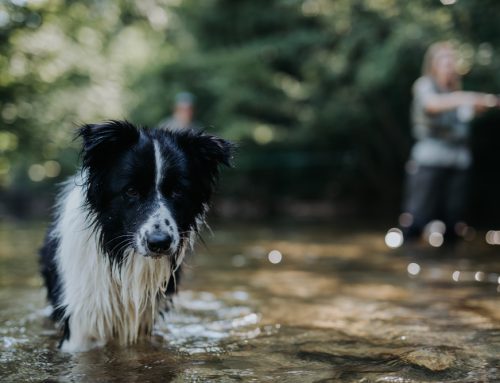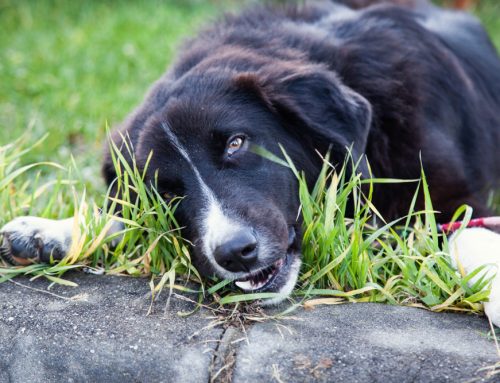You’re adopting a puppy? Congratulations! Bringing a puppy home is exciting, but extensive preparation is required. Our Roosevelt Animal Hospital team loves puppies, and we want to ensure your new, tiny, canine friend gets the care they need. We provide puppy adoption guidelines to keep your new addition safe, happy, and healthy.
Puppy-proof your home
Before bringing a new puppy home, ensure their environment is safe. Puppies are inquisitive and rambunctious, and tend to investigate their world mouth first. Tips to puppy-proof your home include:
- Secure your trash — Garbage cans contain many interesting smells that are extremely enticing to curious puppies. Ensure all your trash containers have secure lids.
- Cover your cords — Many puppies like to chew on electrical cords, so use cord covers to prevent burns or an electrical shock.
- Store potential toxins — Safely store potential pet toxins, such as foods (e.g., grapes, xylitol-containing baked goods, chocolate), medications, cleaning products, rodenticides, glue, and antifreeze, on a high shelf behind a securely closed door.
- Use child-proof locks — Use child-proof locks on cabinets accessible to your puppy to prevent them from getting in trouble.
- Tidy your home — Puppies are chewers, who will chew anything they can reach. Any small object or piece of clothing they swallow can cause a gastrointestinal (GI) obstruction. Keep your floors clutter free, so your puppy isn’t tempted.
- Check your plants — Many common houseplants are toxic to dogs. Ensure plants in your home are puppy-safe.
Quarantine your puppy
Until your puppy is fully vaccinated, they are at high risk for serious, life-threatening infections, such as parvovirus, which means they must not be exposed to any unvaccinated dogs during this time. Ensure dogs who socialize with your puppy are fully vaccinated, avoid dog parks and other areas where multiple dogs congregate, and don’t allow your puppy to investigate other animals’ feces when outdoors.
Ensure your puppy receives the appropriate vaccinations
Starting at 6 to 8 weeks of age, puppies need vaccines every three to four weeks until they are 16 to 20 weeks old. Core vaccines that every puppy needs include rabies, distemper, parvovirus, adenovirus, and parainfluenza. Our team may recommend other optional vaccines, such as leptospirosis, Lyme disease, bordetella, and canine influenza, depending on your puppy’s lifestyle and disease risk.
Test your puppy for parasites
Puppies are often born with parasites, such as hookworms, roundworms, and Giardia, because the worms are passed in utero from a mother to her puppies, or they can be infected shortly after birth. Performing a fecal check on your puppy is important, so our team can prescribe an appropriate deworming medication that will prohibit these parasites from affecting your puppy’s growth, or cause illness.
Socialize your puppy
Exposing your puppy to new people, places, pets, and situations during their first three months is important, so they are properly socialized and will grow into well-adjusted, well-behaved adult dogs. Tips include:
- Make a checklist — Make an extensive checklist of sights, sounds, smells, places, people, other pets and animals, and experiences that your puppy may encounter. Examples include riding in a car, visiting the veterinarian, handling their feet, ears, and mouth, seeing different types of people, walking on grass, asphalt, and dirt, hearing traffic, sirens, and home appliances, and meeting other dogs and pets.
- Go slowly — Gradually expose your puppy to these experiences, but don’t pressure them. For example, when introducing them to new people, first introduce only one person, rather than taking them to a crowded area where they may be overwhelmed. In addition, ensure socialization encounters are short, because puppies tire easily, and you don’t want them to get grumpy during a session.
- Keep experiences positive — Make every experience positive with excessive praise and high quality treats. If your puppy ever seems stressed or fearful, remove them from the situation, and try again later with less exposure.
Crate train your puppy
Crate training provides your puppy with a safe place if they feel stressed or upset, and can help prevent issues such as separation anxiety. Crate training can also help potty train your puppy, because puppies don’t usually eliminate close to where they sleep. Tips include:
- Introduce your puppy to the crate — Introduce your puppy to the crate by leaving the door open and letting them investigate.
- Make the crate inviting — Place comfortable bedding and toys in the crate, and feed your puppy inside.
- Gradually increase your puppy’s stay — Start with short periods in the crate, gradually increasing the time your puppy stays inside.
Provide appropriate chew toys for your puppy

Puppies need to chew, and they will chew your belongings if you don’t provide appropriate toys. Choose chew toys that won’t harm your puppy and avoid the following:
- Toys with sharp edges or breakable parts
- Toys that need batteries
- Bones, which can splinter and damage your puppy’s mouth or GI tract
- Thin, rubber toys that your puppy can chew into pieces
- Soft toys with foam stuffing
Properly transition your puppy’s diet
Any sudden change in diet can cause GI upset. When you bring your puppy home, feed them the same food they were eating previously. Then, gradually transition them to a new diet over 7 to 10 days.
If you adopt a puppy, schedule an appointment with our Roosevelt Animal Hospital team. We want to meet your new addition and start them on an effective health care plan.





















Leave A Comment